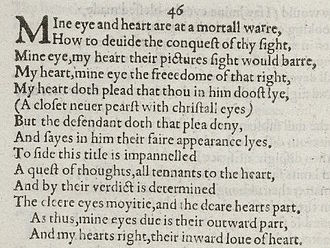Sonnet 46
Q1
Q2
Q3
C
Mine eye and heart are at a mortal war,
How to divide the conquest of thy sight;
Mine eye my heart thy picture’s sight would bar,
My heart mine eye the freedom of that right.
My heart doth plead that thou in him dost lie,
A closet never pierc’d with crystal eyes,
But the defendant doth that plea deny,
And says in him thy fair appearance lies.
To ’cide this title is impanneled
A quest of thoughts, all tenants to the heart;
And by their verdict is determined
The clear eye’s moiety and the dear heart’s part:
As thus; mine eye’s due is thy outward part,
And my heart’s right thy inward love of heart.
4
8
12
14
Sonnet 46 is one of 154 sonnets written by the English playwright and poet William Shakespeare. It is a member of the Fair Youth sequence, in which the poet expresses his love towards a young man. Sonnet 46 is continued in Sonnet 47.
According to the first two lines, the heart wants one thing (emotional love) and the eye wants something different (physical beauty). The third and fourth lines make it clear that while the eye is fixated on the physical appearance of the young man, the heart would prefer not to see the person's physical appearance. Instead, it would focus on emotional love. Lines five and six state that the young man who is the object of the poem resides inside the speaker's heart, where he is unseen by the "crystal eyes". The seventh and eighth lines state that the eyes disagree with the heart and argue that they are capable of detecting of the beauty of a person.
The third quatrain sets up the decision to be made about this 'battle'. Line 9-10 explains that deciding this legal right of possession requires a jury of thoughts and these thoughts are all tenants of the heart. The jury decides the verdict and what share (moiety) the clear eye and dear heart will receive. The rhyming couplet offers the final decision. Author G. Blackmore Evans believes the 'outward part' refers to the external physical beauty; the eyes are granted the exercise of their physical attribute of sight. According to Evans, the 'right' of the heart perhaps suggests the 'natural right' making it a stronger word and emphasizing the superiority of the heart's claim: "'thy inward love of heart' is the spiritual/mental love of your heart and is a 'part' of you in value far beyond the 'due' accorded to the eyes because it is the 'essential' you, not merely the 'appearance'."
...
Wikipedia

